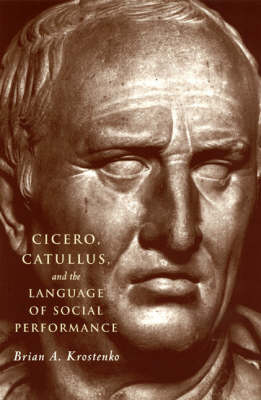
Cicero, Catullus, and the Language of Social Performance
Seiten
2001
University of Chicago Press (Verlag)
978-0-226-45444-3 (ISBN)
University of Chicago Press (Verlag)
978-0-226-45444-3 (ISBN)
Charm, wit and style were essential, but dangerous ingredients in the social repertoire of the Roman elite. This work explores the complexities and ambiguities of charm, wit and style in Roman literature of the late Republic by tracking the origins and development of the terms used.
Charm, wit and style were critical, but dangerous, ingredients in the social repertoire of the Roman elite. Their use drew special attention, but also exposed one to potential ridicule or rejection for valuing style over substance. Brian A. Krostenko explores the complexities and ambiguities of charm, wit and style in Roman literature of the late Republic by tracking the origins, development and use of the terms that described them, which he calls "the language of social performance". As Krostenko desmonstrates, a key feature of this language is its capacity to express both approval and disdain - an artifact of its origins at a time when the "style" and "charm" of imported Greek cultural practices were greeted with both enthusiasm and hostility. Cicero played on that ambiguity, for example, by chastising "lepidus" ("fine") boys in the "Second Oration against Catiline" as degenerates, then arguing in his "De Oratore" that the successful speaker must have a certain charming "lepos" ("wit"). Catullus, in turn, exploited and inverted the political subtexts of this language for innovative poetic and erotic idioms.
Charm, wit and style were critical, but dangerous, ingredients in the social repertoire of the Roman elite. Their use drew special attention, but also exposed one to potential ridicule or rejection for valuing style over substance. Brian A. Krostenko explores the complexities and ambiguities of charm, wit and style in Roman literature of the late Republic by tracking the origins, development and use of the terms that described them, which he calls "the language of social performance". As Krostenko desmonstrates, a key feature of this language is its capacity to express both approval and disdain - an artifact of its origins at a time when the "style" and "charm" of imported Greek cultural practices were greeted with both enthusiasm and hostility. Cicero played on that ambiguity, for example, by chastising "lepidus" ("fine") boys in the "Second Oration against Catiline" as degenerates, then arguing in his "De Oratore" that the successful speaker must have a certain charming "lepos" ("wit"). Catullus, in turn, exploited and inverted the political subtexts of this language for innovative poetic and erotic idioms.
Brian A. Krostenko is an assistant professor of classics at the University of Chicago.
| Erscheint lt. Verlag | 15.4.2001 |
|---|---|
| Sprache | englisch |
| Maße | 17 x 23 mm |
| Gewicht | 539 g |
| Themenwelt | Literatur ► Essays / Feuilleton |
| Geschichte ► Teilgebiete der Geschichte ► Kulturgeschichte | |
| Geschichte ► Teilgebiete der Geschichte ► Sozialgeschichte | |
| Geisteswissenschaften ► Sprach- / Literaturwissenschaft ► Anglistik / Amerikanistik | |
| Geisteswissenschaften ► Sprach- / Literaturwissenschaft ► Literaturwissenschaft | |
| Geisteswissenschaften ► Sprach- / Literaturwissenschaft ► Sprachwissenschaft | |
| ISBN-10 | 0-226-45444-4 / 0226454444 |
| ISBN-13 | 978-0-226-45444-3 / 9780226454443 |
| Zustand | Neuware |
| Haben Sie eine Frage zum Produkt? |
Mehr entdecken
aus dem Bereich
aus dem Bereich
der stille Abschied vom bäuerlichen Leben in Deutschland
Buch | Hardcover (2023)
C.H.Beck (Verlag)
CHF 32,15
vom Mittelalter bis zur Gegenwart
Buch | Softcover (2024)
C.H.Beck (Verlag)
CHF 16,80
eine Geschichte der Welt in 99 Obsessionen
Buch | Hardcover (2023)
Klett-Cotta (Verlag)
CHF 34,90


